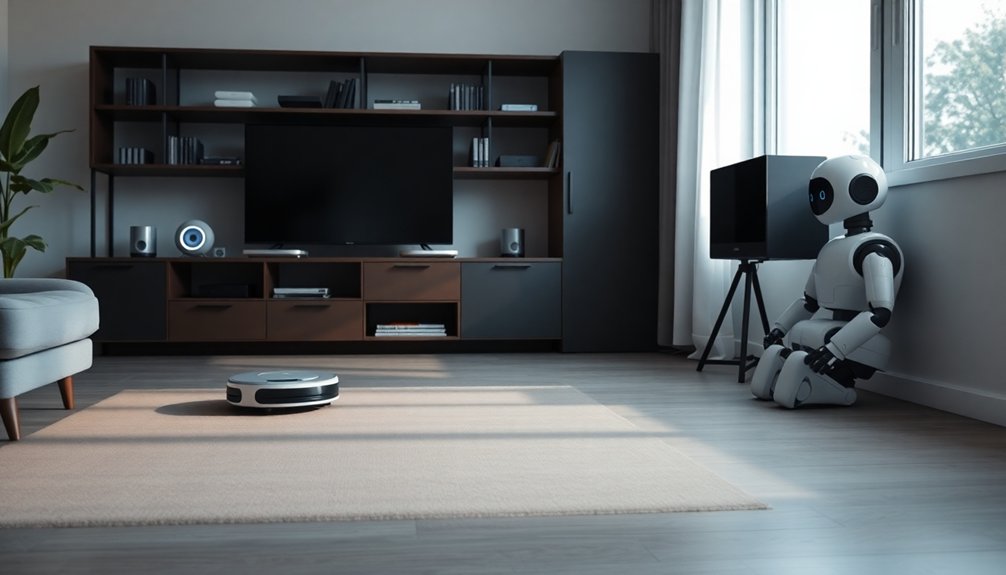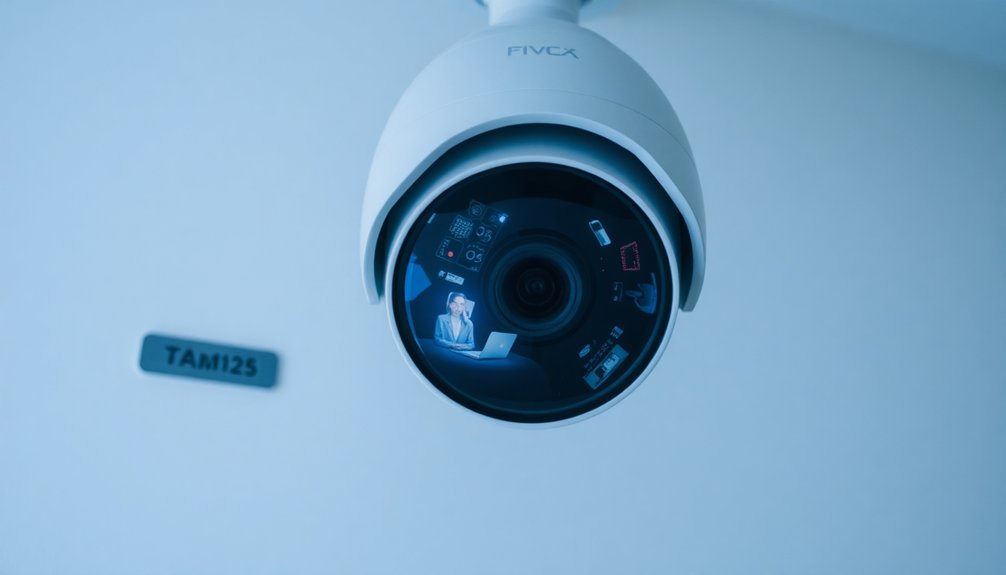Your robot companion knows more about you than your best friend—tracking everything from your midnight snack runs to how deeply you breathe while sleeping. It’s collecting intimate data, transforming personal moments into corporate gold. Where’s the line between helpful tech and digital stalking? You’re trading privacy for convenience, but at what cost? The future isn’t just watching—it’s analyzing your every move. Curious about how deep this rabbit hole goes?
The Rise of Always-On Robotic Companions

While robots used to be the stuff of sci-fi movies, they’re now creeping into our living rooms with an unsettling mix of helpfulness and constant surveillance.
These always-on robotic companions aren’t just cute gadgets; they’re data-collecting machines tracking your every breath, heartbeat, and midnight snack run.
Imagine a robot that knows more about your sleep patterns than your doctor—sounds convenient, right? But here’s the catch: those personal data points come with hefty privacy risks.
A robotic sentinel tracking your nocturnal secrets—convenience masked by an unsettling digital invasion of privacy.
Your robotic buddy isn’t just monitoring; it’s potentially broadcasting your most intimate health details.
Tens of millions of Americans are already inviting these digital watchdogs home, trading privacy for a promise of enhanced wellness and security.
The future’s here, and it’s watching you—constantly, silently, and with an AI-powered gaze that never blinks.
Advanced AI frameworks are now enabling these robots to not only collect data but also learn and adapt to individual user behaviors, raising even more profound questions about the boundaries of personal privacy.
Intimate Monitoring: Health Tracking vs. Personal Boundaries
If privacy were a poker game, robots would be the ultimate card sharks—collecting your most intimate health data like they’re building a royal flush of personal information.
You’ll soon discover these robo-companions aren’t just watching; they’re tracking every breath, heartbeat, and sleep pattern with sensors that feel more invasive than your last doctor’s visit.
Privacy Concerns are real. Your health data becomes a digital goldmine, vulnerable to potential breaches and unauthorized access.
Imagine a robot knowing more about your body than you do—constantly monitoring, analyzing, judging. It’s like having a hypervigilant nurse who never clocks out, blurring lines between helpful technology and personal boundary invasion.
Tactile sensors enable robots to capture intricate physiological data with unprecedented precision and detail.
Are you comfortable being under 24/7 robotic surveillance? The future of privacy and data just got uncomfortably personal.
Data Harvesting: What Information Gets Collected

Because data is the new oil, your home robot isn’t just cleaning floors—it’s drilling deep into the personal information wells of your daily life.
Every breath, heartbeat, and midnight shuffle gets tracked and logged. Want privacy? Too late. These AI companions collect everything: health metrics, audio patterns, movement signatures. They’ll know when you’re stressed, sleeping, or sneaking midnight snacks.
Your robot’s sensors aren’t just innocent observers—they’re data-hungry machines learning your intimate rhythms. Depth perception techniques enable robots to build comprehensive mental maps of your living space, capturing every nuance of your daily existence.
Think your home is private? Think again. These devices transform personal boundaries into information highways, constantly analyzing and categorizing your most mundane moments.
The real question isn’t whether they’re collecting data, but how much you’re willing to surrender for convenience.
Welcome to the future, where your robot knows you better than you know yourself.
The Psychological Impact of Constant Surveillance
When robots start tracking your every move, your brain doesn’t just passively accept the intrusion—it starts to freak out. The psychological impact of constant surveillance isn’t just paranoia; it’s a real mental health minefield.
Consider these privacy nightmares:
Privacy invasion transforms humans into self-policing, anxiety-driven shadows of their authentic selves.
- Anxiety spikes when you know you’re always being watched
- Self-censorship becomes your new default mode
- Personal autonomy shrinks faster than your comfort zone
- The “Panopticon effect” turns you into a stress puppet
Privacy and Security aren’t just buzzwords—they’re your mental defense mechanisms.
Imagine living in a world where every gesture, every whisper gets logged by some emotionless machine. Your behavior changes, your spontaneity dies, and you become a watered-down version of yourself.
Robots might promise convenience, but at what cost to your psychological freedom? The surveillance game is real, and you’re the unwitting player.
Trust, Consent, and the Illusion of Choice

Robots are selling you a grand illusion of control, and you’re buying it hook, line, and sinker.
Your smart home devices whisper sweet nothings about convenience while secretly harvesting every detail of your life. Trust becomes a slippery concept when consent is buried in endless legal fine print that no human actually reads.
You click “agree” without realizing you’re basically handing over a detailed blueprint of your personal world.
Emotional connections with AI make this data grab even more insidious – suddenly, that friendly robot feels like a confidant, not a data-collecting machine.
The privacy settings? They’re a cleverly designed theater, making you think you’re in charge when you’re really just a performer on someone else’s stage.
Neuromorphic computing enables robots to process information with unprecedented intimacy, blurring the lines between technological observation and personal invasion.
Legal Frameworks Struggling to Keep Pace
You’ve got robots streaming into your life faster than lawmakers can draft regulations, creating a wild west of personal data collection where your privacy hangs in the digital balance.
Current legal frameworks like GDPR and CCPA look about as relevant to modern robotics as a horse-drawn carriage does to a Tesla—clunky, outdated, and struggling to catch up with technologies that can track, record, and analyze your every move.
The result? A legal landscape where your personal information is fundamentally fair game, with robots operating in a murky gray zone where consent is more of a suggestion than a requirement.
Technology Outpaces Regulation
As technology races ahead like a souped-up sports car, legal systems are stuck in the slow lane, desperately trying to catch up. Your data privacy hangs in the balance as smart devices become more invasive:
- AI-powered cameras track your every move
- Smart home systems collect intimate personal details
- Devices share information without clear consent
- Surveillance technologies blur personal boundaries
Imagine your robot knowing more about you than your closest friends. The FTC admits existing laws can’t handle this tech tsunami.
You’re fundamentally living in a surveillance playground where your personal information is up for grabs. Who’s watching? Everyone and everything – from your thermostat to your doorbell camera.
The future isn’t just watching; it’s recording, analyzing, and potentially selling your most private moments. Welcome to the wild west of digital privacy. Voice command technologies like those used in robotics are further expanding the potential for unprecedented personal data collection.
Privacy Laws Lag
When digital privacy feels like a game of whack-a-mole, legal systems are revealing their deepest weakness: they’re fighting tomorrow’s tech battles with yesterday’s rulebook.
You’re living in a world where privacy laws can’t keep up with smart robots and AI that track your every move. The ethical questions pile up faster than software updates.
Who really controls your data when a home assistant knows more about your daily routine than your closest friends?
Current regulations are more Swiss cheese than protective shield—full of holes that tech companies exploit with ease. Your personal information becomes a commodity, traded and analyzed while lawmakers debate outdated definitions.
The result? A privacy landscape where technology always wins and individual rights constantly play catch-up.
Ethical Dilemmas in Human-Robot Interactions

Because robots are sneaking into our most personal spaces, we’re facing some seriously weird ethical landmines. Human decision making gets complicated when artificial intelligence starts feeling like a friend who knows too much.
Consider these privacy pitfalls:
- Emotional robots collect intimate data
- Consent becomes blurry when AI seems caring
- Personal boundaries dissolve through constant interaction
- Surveillance happens without explicit permission
You’re basically inviting a high-tech spy into your living room.
These companion robots aren’t just gadgets; they’re data-gathering machines disguised as sympathetic listeners. They’ll remember your secrets, track your moods, and potentially share insights with who-knows-who.
The real question isn’t whether robots can understand human emotions—it’s whether we’re ready to surrender our most private moments to algorithms that see right through us.
Strategies for Maintaining Personal Privacy in a Connected World
Privacy isn’t just a buzzword—it’s your digital survival kit in a world where robots are nosing around your personal space like overly friendly house guests.
Your smart home’s got eyes everywhere, and not the friendly kind. So, what’s a privacy-conscious human to do? First, lock down those device settings like Fort Knox. Treat permissions like a bouncer at an exclusive club—nobody gets in without a solid reason.
Encrypt your data, update firmware religiously, and keep your emotional boundaries tight. Remember, those charming robots aren’t your friends; they’re data-hungry machines waiting to overshare.
Stay informed about local privacy laws, because corporations won’t protect you out of the goodness of their silicon hearts. Your personal information is valuable—guard it like the treasure it is.
People Also Ask About Robots
What Are the Privacy Issues With Robots?
You’ll face privacy risks with robots tracking your crucial signs, monitoring personal spaces, and potentially exposing sensitive data through internet connectivity, raising concerns about consent, surveillance, and unauthorized information collection.
Will the Tesla Robot Watch You Sleep?
If Sarah feels uneasy about constant monitoring, you’ll find the Tesla robot can track your sleep patterns through non-invasive sensors. It’ll analyze breathing and heart rate, potentially raising privacy concerns about intimate surveillance in your bedroom.
How Do Robots See Humans?
You’ll be seen through advanced sensors and AI that detect movement, facial features, and essential signs. Robots track your patterns using cameras, infrared, and depth-sensing technologies to interpret your physical presence and behaviors.
How Do You Think These Robots Might Collect Information About Their Surroundings?
You’ll gather data through infrared sensors, motion detection, and AI-powered audio analysis. Your robot will track movement patterns, detect sounds, and continuously learn about your household’s unique environment and personal behaviors.
Why This Matters in Robotics
You’re being watched, and you know it. With 85% of people feeling uneasy about constant robot surveillance, the privacy battle is just beginning. Your digital companions aren’t just gadgets—they’re data-hungry observers tracking every move. The choice is yours: surrender to the tech tide or draw hard lines about what’s truly personal. We’re not powerless, but we’ve got to get smarter about protecting our digital selves.
